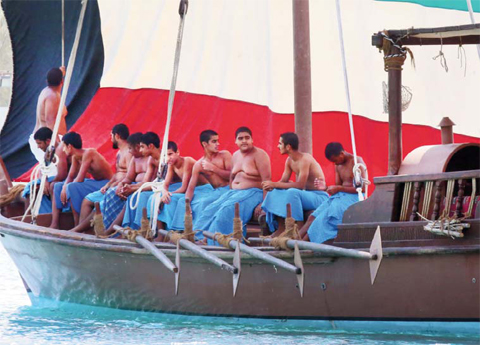 KUWAIT: Hundreds of Kuwaiti youth reenact pearl diving through an annual heritage where they go to sea, live on traditional dhows and dive for pearls like their ancestors before them. — Photos by Yasser Al Zayyat
KUWAIT: Hundreds of Kuwaiti youth reenact pearl diving through an annual heritage where they go to sea, live on traditional dhows and dive for pearls like their ancestors before them. — Photos by Yasser Al ZayyatKUWAIT: The relationship between Kuwait and pearl diving is intertwined and connected with generations of Kuwaitis carrying on the legacy left by the forefathers of the countries. Pearl diving, in the old days, was the main source of income for many Kuwaitis despite the hardships faced by many divers in the vast wide ocean.
A typical day for the divers back then began with early morning (Fajr) prayers followed by a cup of tea or coffee and a small portion of dates. By sunrise, the sailors and divers begin their daily activity of pearl diving which continues between 12 hours to 16 depending on the season. To aid them during their work, pearl divers used to wear specific clothing to enable them to dive and swim properly and also provide minimal protection against jellyfish stings.
Unlike the high sophisticated technology developed for diving today, pearl divers back then had to endure tremendous amount of pressure while diving and also long expeditions which lasts for months all in order to feed their families back at home.
At sunset, the ship's captain, (Nukhatha) in Kuwaiti dialect, orders the divers to halt their activity to perform Maghreb prayers which is followed by a hefty meal of rice and fish followed by Isha prayers and a much needed sleep. After a long much needed slumber, by the next day (Al-Saib), usually an individual in charge of pulling divers from the deep sea floor, and other sailors begin to open the oysters that have been salvaged in the previous day to find those precious pearls.
Though pearl diving has long been abandoned as the main source of livelihood in Kuwait, the younger generation keep the tradition alive by conducting several expeditions during summer season under supervision and sponsorship of the Kuwaiti authorities. - Kuna









